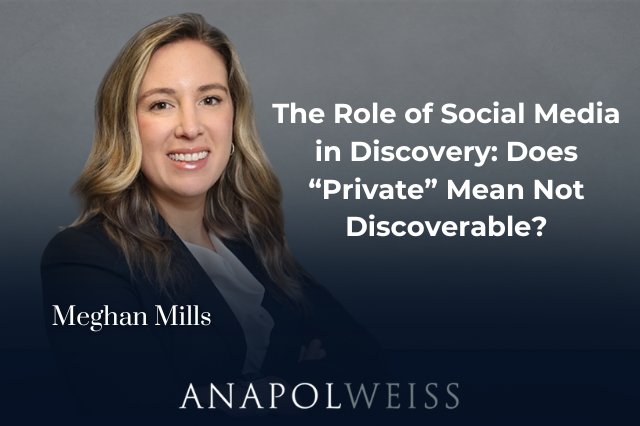
The attorneys at Anapol Weiss are well-versed in the art of procuring and protecting information found on social media sites. We understand what social media information is considered fair game in the eyes of the courts. Perhaps more importantly, we understand how to protect our client’s social media accounts from unreasonable and intrusive requests.
With each generation, social media becomes increasingly entwined with our daily lives. As such, it should then be no surprise that social media has become an increasingly important aspect of litigation. For example, social media posts can be utilized for impeachment, to show location, intent, state of mind, knowledge, and bias. Perhaps the most common uses of social media posts in civil litigation are to either prove or disprove damages/injuries.
It is best practice to find out if your client has any social media accounts at the outset of litigation. If they do, they should be instructed to ensure that their accounts are only accessible to their friends or followers – i.e., they need to make their accounts private. Any information or documents posted onto a public website or social media site is discoverable and will certainly be discovered by opposing counsel. “Those who elect to use social media, and place things on the internet for viewing, sharing and use with other, waive an expectation of privacy.” Allen v. Sands Bethworks Gaming, LLC, No. C-0048-CV-2017-2279 (C.C.P. North. Co. Aug. 6, 2018, Dally, J.).
Making your profile private, by itself, does not prevent that information from being discoverable. Having no appellate authority speaking directly on this matter, the Pennsylvania trial courts have created tests of their own to balance discovery with privacy concerns. First and foremost, to gain access to someone’s private social media profile, the seeker of that information must set forth “facts that suggest relevant information related to the case may be contained within the non-public portions of the profile.” See Trail v. Lesko, 2012 WL 2864004, No. GD-10-017249 (Allegheny C.C.P. July 3, 2012).
In Trail, Judge Wettick discusses nine earlier Pennsylvania trial court decisions and breaks down how each court approached the issue. Judge Wettick notes that “a court order which gives an opposing party access to Facebook postings that, were intended to be available only to persons designed as ‘Friends’ is intrusive because the opposing party is likely to gain access to a great deal of information that has nothing to do with the litigation and may cause embarrassment.” Id. When deciding whether to grant access to one’s private social media posts, the Court balances the level of intrusion against the potential value of the discovery sought. Id. Because “the intrusions the discovery would cause were not offset by any showing that the discovery would assist the requesting party in presenting its case,” discovery of the private posts in Trail was denied.
In Allen v. Sands Bethworks Gaming, LLC, No. C-0048-CV-2017-2279 (C.C.P. North. Co. Aug. 6, 2018, Dally, J.), the Court denied discovery of private portions of a litigate’s social media account because the defense failed to establish a discrepancy between the public portionor the litigate's profile and the claims in the underlying lawsuit. In Allen, during discovery theplaintiff provided limited information regarding her social media accounts. The defense sought tocompel discovery from the private portions of her Facebook profile. In their motion, the defenseclaimed that the pleadings alleged that the plaintiff had been precluded from attending to her“usual duties and activities” and argued that there were discrepancies between the plaintiff’sdeposition testimony and some photos on her public Facebook profile.
In his opinion in Allen, Judge Dally notes that the plaintiff was not claiming that she had been rendered unable to engage in all the activities of daily living, just that her activities had been limited by her right shoulder injury. He goes on to state, “In the Facebook posts and in the portion of Mrs. Allen’s deposition relied upon by the Defendant in support of their motion, there is nothing to suggest the unreliability of Mrs. Allen’s claims with respect to the nature and the scope of her injury, as none of the activities referenced show or suggest the strenuous use of her right shoulder.
Thus, while Mrs. Allen’s public Facebook posts controvert her deposition testimony, it cannot be said that they controvert her legal claims.” While Judge Dally denied the defense’s motion, he notes that the defense can use the public portions of the plaintiff's Facebook profile to impeach the plaintiff’s testimony at trial.
So, what does all of this mean? In short, if you have a publicly accessible social media account, anything you say or do can be used against you in a court of law. Additionally, your “private” accounts are not as private as you may think. If opposing counsel can articulate some facts to a judge that suggests that the private posts contain information relevant information related to your claim or contradicting your claim, the court may order the posts be produced.
You should always be careful about what you post online, but it is especially important while your lawsuit is ongoing. Even a post that you view as harmless can be used to paint you in a negative light.

